
 i_need_contribute
i_need_contribute

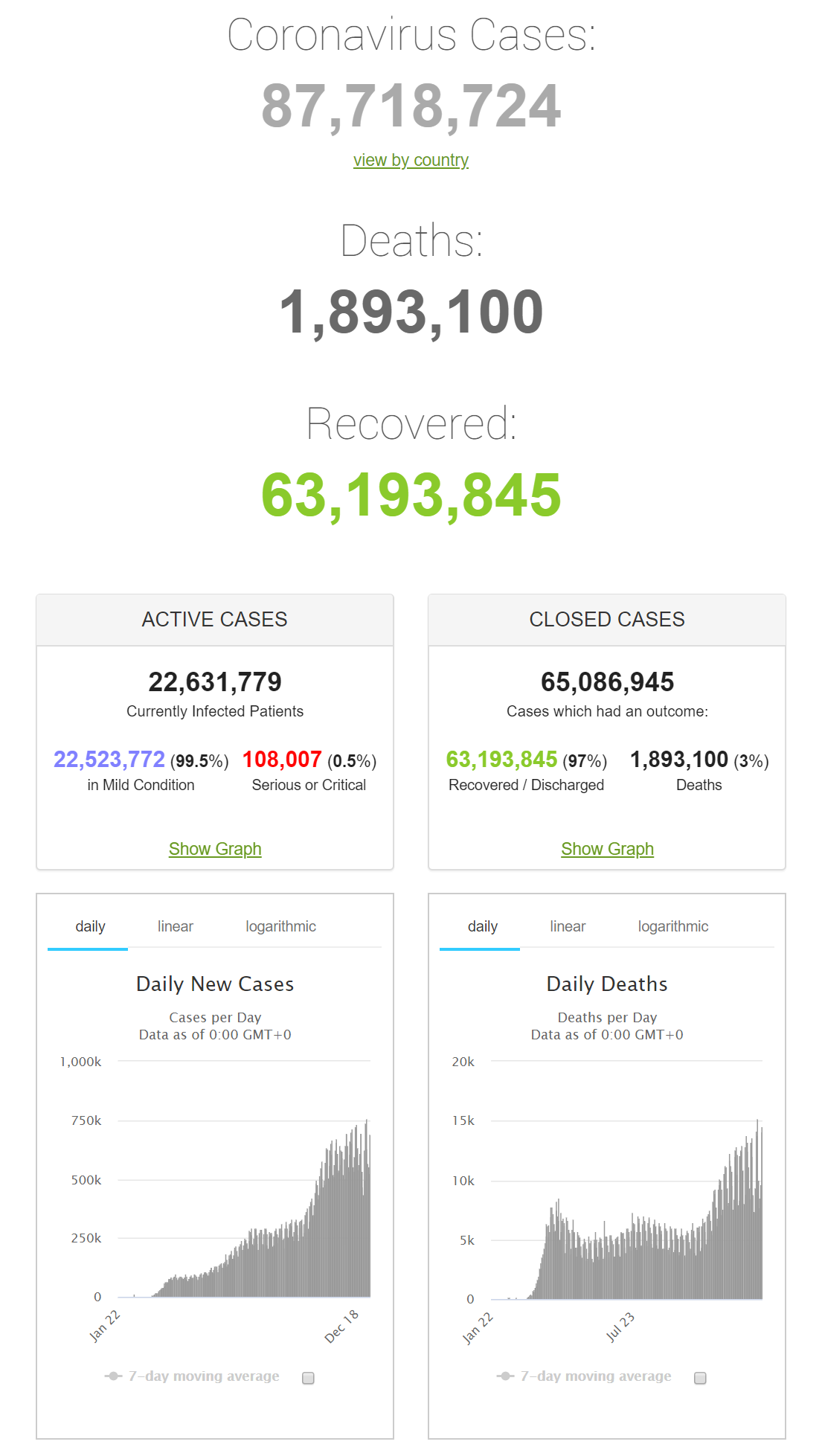
|
Country, |
Total |
New |
Total |
|
World |
87,620,143 |
+781,470 |
1,890,504 |
|
21,857,616 |
+260,973 |
369,990 |
|
|
10,395,938 |
+20,460 |
150,372 |
|
|
7,874,539 |
+62,532 |
199,043 |
|
|
3,308,601 |
+24,217 |
59,951 |
|
|
2,836,801 |
+62,322 |
77,346 |
|
|
2,705,618 |
+25,379 |
66,565 |
|
|
2,283,931 |
+13,830 |
22,070 |
|
|
2,201,945 |
+20,331 |
76,877 |
|
|
1,982,544 |
+16343 |
51,430 |
|
|
1,841,228 |
+26,651 |
38,199 |
|
|
1,719,771 |
+16,805 |
44,723 |
|
|
1,676,171 |
+13,441 |
43,976 |
|
|
1,466,490 |
+11,271 |
128,822 |
|
|
1,344,763 |
+14,151 |
30,055 |
|
|
1,261,903 |
+6,283 |
55,830 |
|
|
1,149,591 |
+21,832 |
31,368 |
|
|
1,090,496 |
+6,911 |
19,357 |
|
|
1,024,432 |
+2,414 |
37,991 |
|
|
841,163 |
+7,099 |
11,999 |
|
|
788,402 |
+8,854 |
23,296 |
|
|
777,072 |
+17,358 |
12,537 |
|
|
654,007 |
+5,719 |
16,299 |
|
|
652,735 |
+1,848 |
19,827 |
|
|
626,800 |
+8,154 |
16,369 |
|
|
625,483 |
+2,382 |
16,816 |
|
|
599,965 |
+839 |
12,865 |
|
|
518,898 |
+978 |
7,687 |
|
|
492,594 |
+2,118 |
10,461 |
|
|
480,730 |
+1,040 |
9,347 |
|
|
463,448 |
+7,309 |
3,527 |
|
|
447,081 |
+1,642 |
7,618 |
|
|
446,606 |
+10,027 |
7,377 |
|
|
372,190 |
+2,469 |
6,525 |
|
|
363,377 |
+118 |
6,272 |
|
|
352,120 |
+2,882 |
3,444 |
|
|
331,768 |
+2,047 |
10,198 |
|
|
302,856 |
+1,553 |
3,955 |
|
|
264,956 |
+5,186 |
4,283 |
|
|
263,193 |
+409 |
1,899 |
|
|
252,317 |
+4,357 |
3,719 |
|
|
233,879 |
+1,800 |
2,666 |
|
|
222,200 |
+799 |
2,818 |
|
|
218,766 |
+2,067 |
689 |
|
|
217,377 |
+1,294 |
14,146 |
|
|
216,286 |
+1,896 |
4,223 |
|
|
206,392 |
+1,002 |
7,961 |
|
|
204,958 |
+1,855 |
1,480 |
|
|
199,925 |
+4,166 |
1,550 |
|
|
196,047 |
+4,959 |
2,657 |
|
|
Dominican |
176,378 |
+529 |
2,419 |
|
175,038 |
+1,447 |
2,267 |
|
|
174,995 |
+2,216 |
1,450 |
|
|
165,268 |
+1,597 |
9,241 |
|
|
160,853 |
+309 |
2,890 |
|
|
159,044 |
+742 |
2,262 |
|
|
152,438 |
+411 |
938 |
|
|
152,219 |
+2,721 |
2,036 |
|
|
149,881 |
+2,820 |
5,004 |
|
|
147,871 |
+950 |
3,088 |
|
|
145,590 |
+1,007 |
7,975 |
|
|
145,061 |
+209 |
245 |
|
|
144,257 |
+1,088 |
1,519 |
|
|
142,267 |
+814 |
5,099 |
|
|
140,202 |
+783 |
4,899 |
|
|
131,724 |
+3,354 |
2,899 |
|
|
129,888 |
+114 |
1,504 |
|
|
128,178 |
+594 |
2,785 |
|
|
126,786 |
+545 |
1,965 |
|
|
125,438 |
+2,593 |
513 |
|
|
123,822 |
+424 |
3,186 |
|
|
121,154 |
+7,832 |
2,299 |
|
|
114,908 |
+246 |
1,047 |
|
|
111,694 |
+898 |
2,337 |
|
|
102,880 |
+424 |
1,546 |
|
|
101,120 |
+247 |
2,786 |
|
|
97,398 |
+271 |
1,694 |
|
|
94,369 |
+1,664 |
1,324 |
|
|
94,284 |
+289 |
353 |
|
|
87,215 |
+32 |
4,634 |
|
|
85,328 |
+619 |
2,571 |
|
|
81,656 |
+144 |
1,361 |
|
|
77,350 |
+55 |
615 |
|
|
65,818 |
+839 |
1,027 |
|
|
61,008 |
+725 |
1,217 |
|
|
58,780 |
+31 |
29 |
|
|
52,967 |
+787 |
465 |
|
|
50,697 |
+643 |
705 |
|
|
47,645 |
+290 |
1,382 |
|
|
47,430 |
+281 |
517 |
|
|
6,666 |
+80 |
126 |
|
|
5,811 |
+95 |
50 |
|
|
1,505 |
+1 |
35 |
Retrieved from: https://www.worldometers.info/coronavirus/
From CNN's Kara Fox, James Frater and Stephanie Halasz
The European Union has authorized Moderna's Covid-19 vaccine, the second coronavirus vaccine to be approved for use in the EU.
The move finalizes the recommendation of the European Union drugs regulator, which earlier on Wednesday recommended granting the drug a conditional marketing authorization.
Emer Cooke, the European Medicines Agency (EMA) executive director, said on Wednesday that "this vaccine provides us with another tool to overcome the current emergency."
"It is a testament to the efforts and commitment of all involved that we have this second positive vaccine recommendation just short of a year since the pandemic was declared by WHO," she said.
The EU has secured the purchase of up to 160 million doses of the Moderna vaccine -- enough to vaccinate 80 million people of its 448 million citizens -- as part of a joint vaccine strategy aimed to ensure equitable access across the bloc.
Under that contract, the US biotech firm has promised to deliver all their doses between now and September 2021, the European Commission said.
Moderna said in a statement that the first deliveries of their vaccine "from Moderna's dedicated non-US supply chain are expected to begin next week."
From CNN's Michael Nedelman
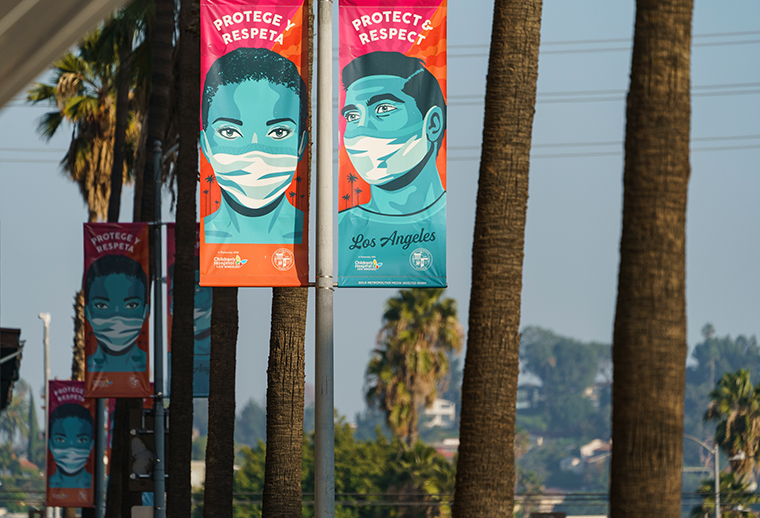
Banners advising people to wear masks against the coronavirus hang along Hollywood Boulevard in Los Angeles on Tuesday, Jan. 5, 2021. Damian Dovarganes/AP
At least 52 cases of a coronavirus variant first identified in the United Kingdom have been identified in the United States, according to the CDC on Wednesday.
This includes 26 cases in California, 22 cases in Florida, two cases in Colorado, and one case in Georgia and New York.
CDC says this does not represent the total number of cases circulating in the US, but rather those that have been found by analyzing positive samples. The agency cautions that its numbers, which are expected to update on Tuesdays and Thursdays, may not immediately match those of state and local health departments.
While the variant appears to spread more easily than Covid-19, there's no evidence that it's more deadly or causes more severe disease, according to CDC.
Experts suspect there could be many more cases in the US and have criticized the country for not doing more genetic sequencing of virus samples to surveil for mutations. On Sunday, a CDC official told CNN the agency plans to more than double the number of samples it sequences over the following two weeks -- with a target of 6,500 per week.
The earliest known US sample that carried the current version of the variant was taken on December 19 in Florida, according to the genomic database GISAID. However, collection dates are not available for all samples.
From CNN's Niamh Kennedy in Dublin
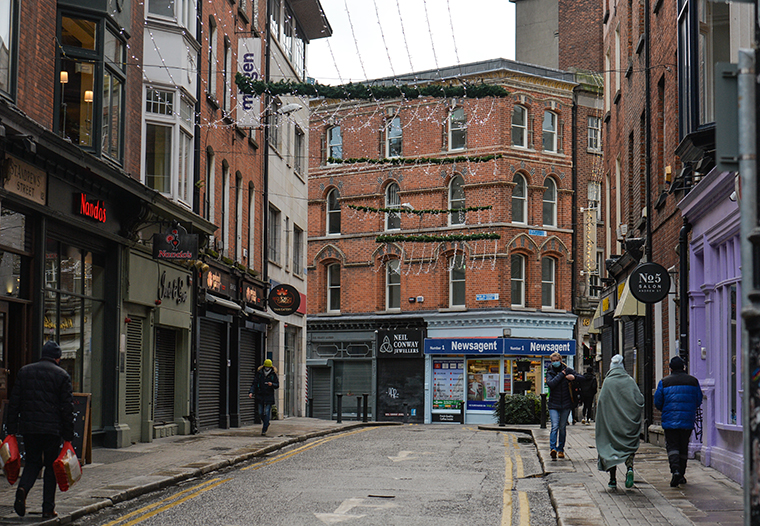
An empty street in Dublin city center on Monday, January 4, 2021, in Dublin, Ireland. Artur Widak/NurPhoto/Getty Images
Ireland has further tightened its Covid-19 lockdown measures, closing construction sites and schools across the country, Prime Minister (Taoiseach) Micheál Martin announced Wednesday, adding that such measures would be necessary "to suppress the surge and flatten the curve once again."
Under the new restrictions all schools will close and move online until the end of January. An exception has been made for final year students, who will be allowed to attend school three days a week from January 11.
Other childcare services will also close, with exceptions made for vulnerable children and the children of frontline workers.
Non-essential construction projects will be ordered to close from 6pm on Friday, Martin added, acknowledging "how severe a measure this is on the construction sector."
On Wednesday, 7,836 new cases were recorded by Ireland’s Department of Health, and national hospitalization figures surpassed those from the first wave of the pandemic, Ireland’s Health Executive boss Paul Reid said on Twitter.
This surging case rate prompted the Irish government to re-impose Level 5 lockdown measures on December 30.
Taoiseach Martin said Wednesday that the situation in Ireland "is not dissimilar to what is happening in the UK in terms of the rapid growth in community transmission and rapid hospitalizations."
From CNN's Nyasha Chingono
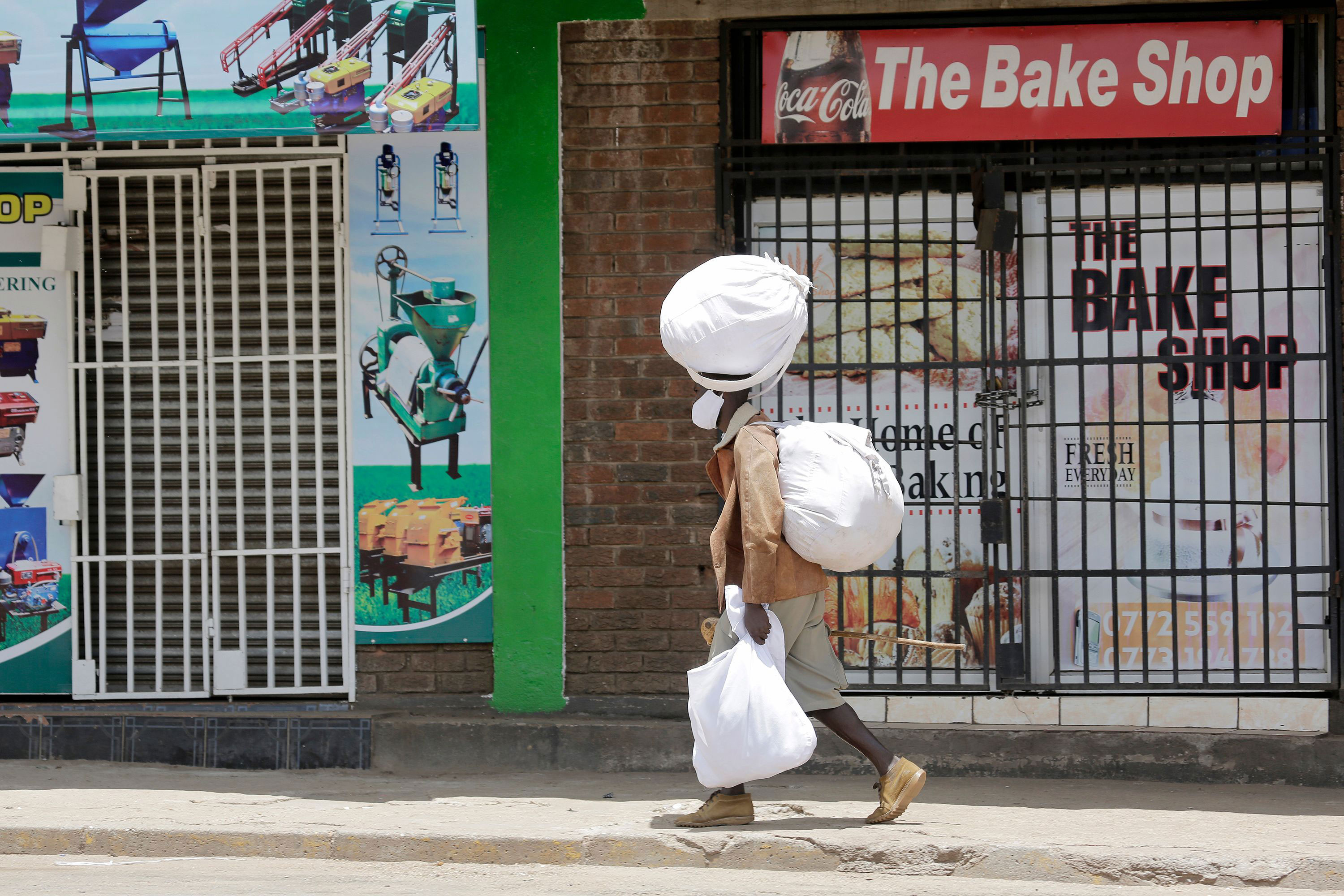
A person passes closed shops in downtown Harare, Zimbabwe, on January 5. Aaron Ufumeli/EPA-EFE/Shutterstock
Doctors in Zimbabwe have said the health system is overwhelmed and could collapse as the country battles a new wave of infections that has prompted a strict new 30-day lockdown.
After the Christmas holidays, Zimbabwe recorded an increase in Covid-19 infections and deaths, raising fears for an already fragile healthcare system.
The government has urged citizens to adhere to the lockdown, which includes movement restrictions to all but the most essential services.
The reopening of schools has been postponed indefinitely, following a Covid-19 outbreak in schools last term, while shops will only be open until 3 pm daily.
A dusk-to-dawn curfew is also in place to avoid night gatherings and events.
Retrieved from: https://edition.cnn.com/world/live-news/coronavirus-pandemic-vaccine-updates-01-07-21/index.html
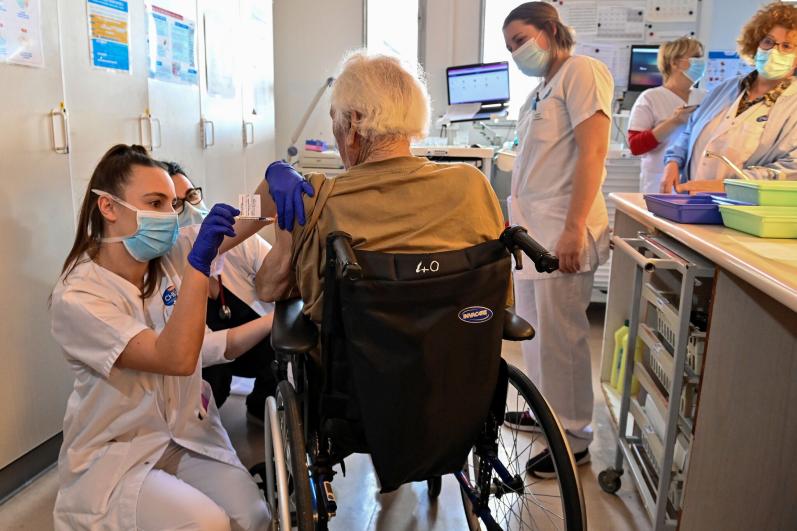
Many countries in Europe and elsewhere have been criticized for rolling out Covid-19 vaccinations too slowly. And then there is France.
Only about 7,000 people have been vaccinated in France, the authorities said on Tuesday — a tiny fraction of the number in Germany (more than 316,000) or in Italy (more than 178,000).
The French government says it is following the strategy set out by the country’s top health authority, focusing the first wave of inoculations almost exclusively on residents of retirement or nursing homes.
But critics say the process is bogged down by red tape, preventing those who want a shot from getting one, while doing little to reassure those who are skeptical about the inoculations. One poll this week found that nearly 60 percent of respondents in France did not want a Covid-19 vaccine, up 8 percentage points from last month.
President Emmanuel Macron has privately vented to his staff that the pace of inoculations was like a “family stroll,” according to the Journal du Dimanche.
Jean Rottner, a doctor and center-right politician who is the regional president of Grand Est, in eastern France, said on the television channel France 2 this week that getting vaccinated was “becoming more complicated than buying a car.”
Jérôme Goeminne, who manages a group of hospitals in that region, said in an interview that it made sense to prioritize retirement and nursing homes to keep older and more vulnerable patients from overwhelming hospitals. And he said that some of the delays were inevitable.
Still, Mr. Goeminne said that the government had not given the local health authorities enough flexibility.
“Once it’s launched, things will roll ahead, but the execution is long,” he said. “There is a cultural aversion to risk in France,” he added.
Responding to the criticism, officials are speeding up their timetable. Health workers, firefighters and home-based care givers over the age of 50 are now able to get their shots — ahead of schedule.
Olivier Véran, the French health minister, also announced on Tuesday that anyone over 75 would be eligible for vaccination by the end of January, that hundreds of vaccination centers would open by the end of the month and that any French person who wanted a shot would soon be able to sign up for an appointment.
“We are now going to amplify, accelerate and simplify our vaccination strategy,” Mr. Véran told RTL radio on Tuesday, vowing that France would catch up with its European neighbors in the coming days.
More than 66,000 people have died in France so far because of the virus, and the number of hospitalized patients is stuck at about 25,000. Museums and movie theaters are closed, as are bars and restaurants.
Exclusive by Sean Ingle
The International Olympic Committee is working on ways to get athletes the coronavirus jab in the second or third wave so that the Tokyo Games can go ahead safely in July, the Guardian has been told.
While insisting that we “do not want to queue jump”, IOC sources are hoping athletes from around the globe will be high up on the vaccination list, once key workers and the vulnerable are given the jab.
Several sources in the Olympic movement have also indicated that they remain confident the Games will take place in some form this summer. However the rise of several new coronavirus variants and the steep jump in cases in Japan – which reported a record 5,307 daily cases on Wednesday – has led to a growing desire to get athletes vaccinated in the coming weeks and months.
The IOC is aware that it needs to tread a fine line between ensuring athlete safety and appearing overly pushy, and there were some eyebrows raised in Lausanne on Tuesday when one IOC member, Dick Pound, suggested there would be no public outcry if athletes jumped the queue – and that “it was the most realistic way” of ensuring the Tokyo Olympics went ahead.
Pound, the longest-serving member of the IOC, told Sky News: “In Canada where we might have 300 or 400 athletes – to take 300 or 400 vaccines out of several million in order to have Canada represented at an international event of this stature, character and level – I don’t think there would be any kind of a public outcry about that. It’s a decision for each country to make and there will be people saying they are jumping the queue but I think that is the most realistic way of it going ahead.”
IOC sources stressed to the Guardian that the situation was more nuanced than Pound had made out.
Previously the IOC president, Thomas Bach, has encouraged athletes to have a Covid-19 vaccination before Tokyo 2020 but insisted it would not be an entry requirement. That is partly because there is an appreciation that some athletes’ faith may mean they are uneasy about using a vaccine containing pork-derived gelatin, which is widely used as a stabiliser to ensure it remains safe and effective during storage and transport.
While not commenting on Pound’s comments, or suggestions it wanted athletes to be vaccinated in the second or third wave, the IOC did confirm it would be making “all efforts to have as many foreign participants as possible” vaccinated before the Games.
“Together with the National Olympic Committees, we will make all the efforts so that the NOCs encourage and assist their athletes, their officials and their stakeholders to get vaccinated before they come to Japan,” the IOC said.
“We are doing so, of course, in order to contribute even more to the safe environment in the Games, but also out of respect for the Japanese people because they should be confident that everything is being done to not only protect the participants, but also the Japanese people, by having as many of the visitors as possible being vaccinated.”
The British Olympic Association and UK Sport have discussed how they could get a Covid vaccine to athletes by July but it is understood they are not in active conversations with the government. The BOA chief executive, Andy Anson, said: “The priority has to be the people who need it most; frontline workers, the elderly and the vulnerable. There will come a time, hopefully ahead of the Olympic Games, when the athletes can be considered for vaccination but we’ll only do that when it’s appropriate.”
Retrieved from: https://www.theguardian.com/sport/2021/jan/06/ioc-seeks-covid-vaccines-for-athletes-in-second-wave-tokyo-olympics
By Paul Karp
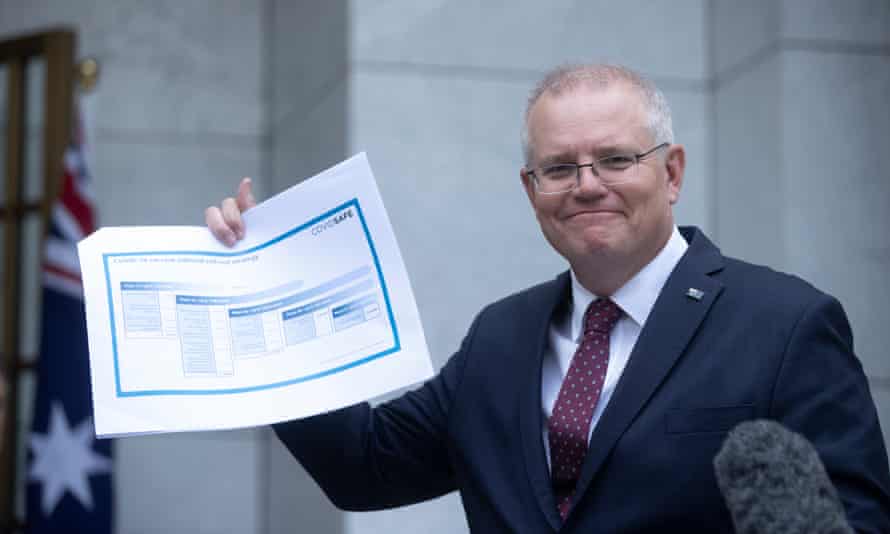
Australian PM Scott Morrison announces the national Covid 19 vaccine rollout plan on Thursday. Some 700,000 frontline workers in the health sector, border enforcement, hotel quarantine, aged care, and disability care; and residents of aged and disability care, will be the first to receive it. Photograph: Mike Bowers/The Guardian
The rollout of the Covid-19 vaccine in Australia has been brought forward to mid-to-late February with the Morrison government aiming to have four million receive the jab by March.
Announcing the accelerated rollout on Thursday, the prime minister Scott Morrison also indicated it would be up to the states and territories to decide whether the vaccine could be made compulsory for some groups, such as aged care workers.
Australia is aiming to complete Therapeutic Goods Administration approval of the Pfizer vaccine by late January, after which it will take up to two weeks to be delivered and up to a week for batch-testing. The AstraZeneca vaccine is expected to be approved in February.
Morrison set out a process to begin vaccination, with the first recipients being high-priority groups including 700,000 frontline workers in the health sector, border enforcement, hotel quarantine, aged care, and disability care; and residents of aged and disability care.
Morrison said starting with 80,000 vaccinations a week, Australia would aim to ramp that up in order to vaccinate four million people by the end of March.
The second tier of six million recipients is made up of Australians aged over 70, Aboriginal and Torres Strait Islanders over 55, healthcare workers, younger adults with underlying health conditions and emergency services workers.
The third tier to gain access will be those aged 50 to 59, and Aboriginal and Torres Strait Islanders aged between 18 and 54. The fourth tier consists of the rest of the adult population, while children under 18, if recommended, will be the last to receive the vaccination.
As recently as 28 December, the health minister Greg Hunt said that the vaccination will be “free, universal and entirely voluntary”.
But on Thursday, Morrison revealed states and territories will need to achieve “national consistency in public health orders, which is the process by which any requirement to have a vaccine is made legal across Australia”.
He said that states and territories were yet to decide “where if, in any cases, there is a requirement to have that vaccine”.
Asked how this could be reconciled with earlier assurances the vaccine would be voluntary, Morrison replied: “It is voluntary. But that is an important discussion on the public health and safety that needs to be had with states and territories, who are responsible for public health.”
The comments leave open the possibility states could mandate the vaccine, but Morrison dismissed this as “over-interpretation”.
On Thursday the secretary of the health department, Brendan Murphy, recommitted that the vaccine will be free with “no barrier whatsoever” such as out-of-pocket costs.
On 23 December, the Labor leader Anthony Albanese called for an accelerated rollout of Covid-19 vaccines after they receive approval by the Therapeutic Goods Administration, a call later echoed across the political spectrum and by independent experts who want faster vaccination to respond to the UK super-strain.
At the time, Hunt characterised Albanese’s call as irresponsible, but has since announced two revisions in the vaccine rollout timetable.
Asked about repeated assurances Australia was at the front of the queue for vaccines, Morrison explained it had taken a “cautious” approach to preserve public confidence in the vaccines.
Hunt argued the rollout is in line with other countries that have opted against emergency approvals due to lower coronavirus case numbers, such as New Zealand, South Korea, Japan and Taiwan.
“Safety leads to confidence, and confidence leads to higher vaccine take-up,” he said.
Ahead of a national cabinet meeting on Friday, the Victorian premier Daniel Andrews has indicated Australia is likely to adopt pre-flight testing and more constraints on international flight crews to prevent the UK super-strain spreading in Australia.
Andrews told reporters in Melbourne that he supports both pre-flight testing of passengers and for crew to be treated “like returned travellers”, meaning they would remain in quarantine at least until they had received a negative coronavirus test and possibly for a full 14 days.
Victoria will also push for daily testing of hotel workers – a “comprehensive strategy” that will ensure that any leakages from hotel quarantine “will have a one-day jump on us, not a week or 10 days”, he said.
Andrews said that people with the UK super-strain were infecting on average four other people, warning that the virus “will get away from us” very quickly if it is introduced to the Australian community.
The measures are being considered by the Australian Health Protection Principal Committee, but Andrews said Victoria had “lead the charge” and he is “confident” the measures will be adopted at national cabinet on Friday.
Morrison was less definite, but said the discussion among chief health officers had been “very collaborative” and “if they are in agreement” national cabinet will likely adopt the measures.
Retrieved from: https://www.theguardian.com/society/2021/jan/07/australia-to-roll-out-covid-vaccine-in-february-with-goal-for-four-million-jabs-by-march
Here are the key developments from the last few hours:
· US reports record daily deaths. The Johns Hopkins University tracker, which relies on official government data, has just posted the data for 6 January – the same day as the Capitol attack – which shows the US again suffering a record daily death toll, with 3,865 Americans dying in 24 hours. This is the first time the toll has passed 3,800. 145,000 cases were reported on 6 January.
· Hospitals in London could soon be overwhelmed by Covid-19 and left short of almost 5,500 beds they need to cope with the explosion in cases, NHS leaders have revealed. The health service’s lead doctor for the capital shared the worrying analysis with the most senior medics in the city’s NHS hospital trusts on a Zoom call on Wednesday afternoon.
· Mexico has reported a new high for a daily increase in coronavirus cases, with 13,345 newly confirmed infections reported Wednesday for the previous 24 hours. Officials also reported a near-record of 1,165 deaths related to Covid-19.
· Arizona has become the Covid “hot spot of the world”, public health experts warned, as the US state saw a triple-digit number of new virus-related deaths for the second day in a row.
· Japan to declare state of emergency for greater Tokyo. Japan is to declare a state of emergency in the greater Tokyo area later today, after a record number of coronavirus cases were reported in the capital and across the country. The prime minister, Yoshihide Suga, has come under pressure from his own health experts to take action, as the country battles a third wave of infections far more serious than those seen earlier in the pandemic.
· China reports highest local cases since July as travel to Hebei province blocked. China reported 63 new Covid-19 infections on Thursday – the highest single-day tally since July – as authorities try to stamp out an outbreak of the virus in a city of 11 million near Beijing.
· World Health Organization experts warned Wednesday there could be six months of “hard, hard road ahead” in 2021 before vaccines turn the tide against the coronavirus pandemic. Maria Van Kerkhove, the WHO’s technical lead on Covid-19, said that in many countries, the situation was very worrying - and would get worse.
· Pandemic stress may be causing people to lose their hair, according to a new study. By mid-summer, rates of a hair-shedding condition called telogen effluvium (TE) had surged more than 400% in a racially diverse neighborhood in New York City, researchers report in the Journal of the American Academy of Dermatology.